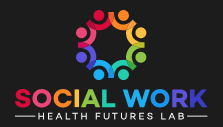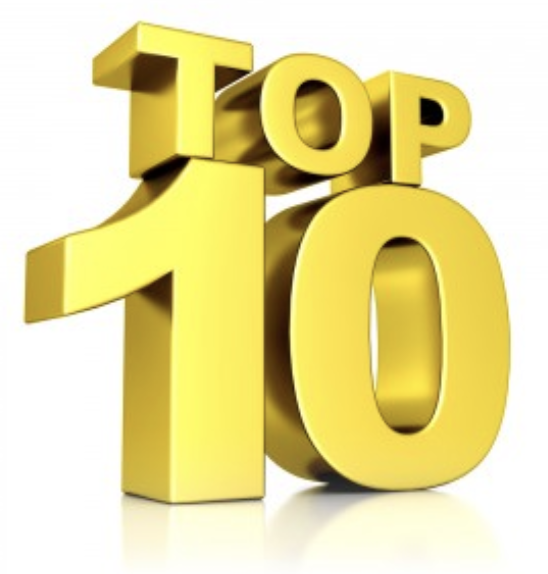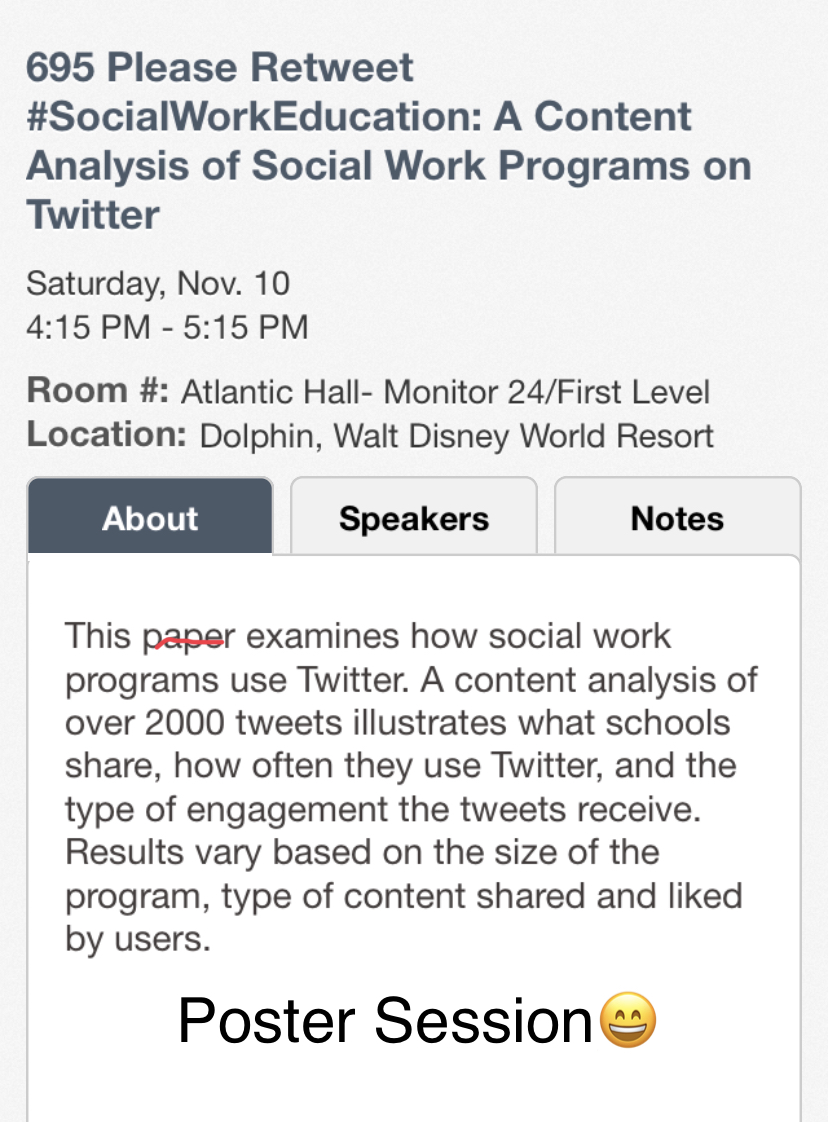
Once again I find myself attending the Council on Social Work Education’s Annual Program Meeting in Denver, Colorado. I really enjoy this city and all it has to offer, but the main purpose of this post is to highlight some of my research and give more context to the work I am presenting at this conference. I have already written one blog post about this conference and my poster presentation, which you can view here.
This post is mainly to highlight my two other presentations during the conference. One related to my work to better understand how Social Work Schools and Programs use Twitter, and the other to illustrate how to teach Digital Literacies. The first presentation is based on a research paper that is currently under review. The title and proposal are below:
#SocialWorkEducation: Using Data Science to Understand How Social Work Programs use Twitter
Social media can be a valuable tool in social work education to help collaborate with others, promote programs, engage with alumni, or promote interprofessional education. Social media are defined as an array of digital technologies that allow for the creation and exchange of user-generated content (Kaplan & Haenlein, 2010; Kanter & Fine, 2010) and include digital platforms such as Facebook, Twitter, YouTube, and Snapchat. There is a growing awareness that social work practitioners, students and educators need to be adept at using social media and information communication technology as part of their practice and interaction with clients and organizations of all sizes (Coe Regan & Freddolino, 2008; Getz, 2012; Hitchcock & Young, 2016; National Association of Social Workers [NASW], 2017). As more and more organizations adopt social media to promote their services (Goldkind, 2015; Young, 2017), social work education programs have also utilized social media for a variety of purposes.
The purpose of this paper is to examine how social work education programs use Twitter by leveraging the principles of data science. Data science allows for the analysis of big data sets that can be structured or unstructured to develop understanding, extract knowledge, and formulate actionable results (Cariceo, Nair, & Lytton, 2018, p. 1). Specifically, a text and sentiment analysis of 26,000 tweets, collected over a 10-month period, was performed utilizing the Information, Community, and Action framework (Lovejoy & Saxton, 2012). The author first coded a sample of 2,000 tweets with graduate research assistants utilizing the framework to help identify keywords that could be used in performing a larger text analysis. The sample of tweets also helped to establish more rigor and validity for this study as the author was able to obtain an inter-rater reliability score of 72%. Disagreement within the sample of tweets was addressed and discussed to help identify the most meaningful keywords and categories that could be used for the larger database of the 26,000 tweets. Utilizing the Lovejoy & Saxton (2012) framework categories and keywords, Microsoft Excel along with Microsoft’s Azure Artifical Intelligence Software was utilized to analyze the larger database to identify how social work programs use Twitter and what kind of tone, or sentiment, their tweets contain. Sentiment analysis identifies tweets as positive, neutral, or negative based on the frequency of words within the tweet by using a lexicon. This data mining analysis helps to illustrate how programs engage with other Twitter users to promote their respective schools or programs.
The findings suggest that programs tweet primarily to share information about a variety of topics and opportunities, categorized as Information. Programs also tweet calls to action and try to engage with their online community but not at the same level of sharing information, categorized as Action. A smaller sample of the tweets did engage in more of a dialogic connection between users to promote conversation or interaction, categorized as Community. A majority of the tweets have a neutral sentiment with some also being identified as positive or negative. Interestingly, larger programs were able to produce more tweets and engage with a larger audience. Tweets by larger programs often received more likes and retweets than other smaller programs. A possible reason for this could be the number of staff available in larger programs, but more research is needed to have a definitive conclusion.
Social Work programs can play a pivotal role in helping students to become lifelong learners, increase their digital literacies, and model ethical and appropriate technology use through their curriculum and online presence. However, technology in social work education has been adopted sporadically with moderate degrees of success. This paper supports this notion by evaluating how social work programs use Twitter for a variety of purposes. Attendees will understand how programs are using Twitter and gain ideas for their own programs and efforts regarding the use of social media. By examining the past usage of Twitter, this presentation will help participants look forward to understanding how to use Twitter in more effective ways.
This research project has been fun and challenging as I have had to learn how to use new software to capture and analyze Big Data from Twitter. I mainly used Microsoft’s suite of tools but also supplemented with Rstudio where needed. Computational social science is a new area for me and I still have so much to learn but my hope is that this project will launch some important conversations and future research. One specific aspect that came out of this research was the development of the Top Ten Social Work Schools/Programs on Twitter. Be sure to click the link to find out more 🙂
The second presentation in Denver is related to my ongoing work around New Media Literacies or Digital Literacies, which I have written extensively about here on my blog and in the literature. This presentation has been a few years in the making and something that I myself have even had challenges with, which is why the title of this workshop is so pertinent.
What if there’s no WiFi? Teaching Digital Literacies in Social Work Education
Over the past several years social media and digital technologies in social work education and practice has exploded with books, articles, and trade publications being devoted to the topic (Goldkind, Wolf, & Freddolino, 2018; Hitchcock & Young, 2016; Hitchcock, Sage, & Smyth, 2018). The expectation among students to become digitally competent professionals has been discussed in the literature and many recognize the need to infuse these technologies into the classroom in ways that can build technical competence, social and cultural competencies, and digital literacies (Perron, Taylor, Glass, & Margerum-Leys, 2010; Young, McLeod, & Brady, 2018). Digital literacies has become essentially an umbrella term that covers many forms of literacy (Considine, Horton, & Moorman, 2009). Media literacy generally refers to “the ability to access, analyze, evaluate, and communicate messages in a wide variety of forms” (Hobbs, 1998, p. 16). The emphasis of media literacy is learning and teaching skills related to the process of critically analyzing and creating messages in a variety of print or digital forms (Hobbs, 1998). There has been an emergence within the literature regarding the use of social media and digital technologies for the acquisition of specific social work skills that mirrors the forms and methods of media literacy (Hitchcock & Young, 2016; Jones, Sage, & Hitchcock, 2019; Sage, Singer, LaMarre, & Rice, 2018; Young, 2015). The challenge with digital literacies in social work education is that the concept is too broadly defined, and it has not been thoroughly developed, discussed, or researched enough to provide specific guidance on what conceptual framework of digital literacies is suited to the development of professional social work skills. Teaching digital literacies needs to move beyond the skills of critical analysis to building the capacity for engaging, understanding, and communicating with others in a genuine, authentic, and ethically appropriate manner. Digitally literacies are as much about understanding the how as they are about understanding the why.
The purpose of this workshop is to differentiate between the concepts of digital and media literacies (Belshaw, 2011; Hobbs, 2011; Jenkins, Clinton, Purushotma, Robison, & Weigel, 2009; Rheingold, 2012) as they apply to social work education. Participants will learn about leveraging the participatory culture of social media through the pedagogical framework of Connected Learning to create applied learning activities that motivate students to learn. “Participatory culture is a culture with relatively low barriers to artistic expression and civic engagement, strong support for creating and sharing creations, and some type of informal mentorship whereby experienced participants pass along knowledge to novices” (Jenkins et al., 2009, p. 3). The Connected Learning framework rests on six principles: it is interest driven, peer supported, academically oriented, openly networked, production centered, and maintains a shared purpose (Ito et al., 2013). The essential part of Connected Learning and Participatory Culture comes down to the idea of epistemology, or how one comes to know what one knows. It is important to be able to use knowledge, skills, and values in the participatory culture of social media to better understand how to function, participate, collaborate, and ultimately achieve some task or goal. Fortunately, bridging all these ideas together in the classroom is relatively easy and educators can accomplish multiple objectives in their quest to enhance the digital literacies of their students.
The specific digital literacies that will be covered in this workshop stem from the 12 New Media Literacies Skills identified by Jenkins et al. (2009). These skills include appropriation, performance, judgement, simulation, transmedia navigation, multitasking, distributed cognition, collective intelligence, play, networking, negotiation, and visualization. Participants will understand what each term means and explore specific strategies to teach each skill using technology when appropriate, or not using any technology at all if there is no WiFi for instance. It is important to consider which digital literacies to utilize in the classroom because a careful review will ensure that the educator has matched the literacies appropriately to their learning objectives in the course. It’s important to remember that social media and digital technologies are just tools and should not be used to replace sound pedagogy (Young, McLeod, Brady, 2018). However, building applied learning activities around the ideas of new media literacies can help students to realize the potential of social media and digital technology for solving complex issues and developing tangible skills that will be incredibly useful during the course of their professional career. Through the demonstrations in this workshop educators will be able to help students develop the requisite technical, social, and cultural competencies to be ethical and effective social workers.
This workshop will be very hands-on, which is good because it is early early Sunday morning 🙂 Hopefully social work educators will come away from the workshop understanding that digital literacies are critically important for our students and that while we can teach them the necessary skills, knowledge, and values to ensure they are competent ethical professionals, we don ‘t necessarily need to rely on technology to get the job done. This may sound weird, especially coming from a technology advocate like myself, but in the real world, we may not always have access to the latest technologies or even the fastest internet. We should not let that slow us down in terms of preparing our students for the vastly digital world we now practice in.



 The actual reason for this post is to just mention that I have been granted tenure and promotion to Associate Professor here at California State University-San Marcos. Some of you that follow me on Twitter already know this but we had a small celebration last night for all the faculty that were recently promoted. It was a nice gathering and incredibly interesting to hear about the work of my colleagues across campus.
The actual reason for this post is to just mention that I have been granted tenure and promotion to Associate Professor here at California State University-San Marcos. Some of you that follow me on Twitter already know this but we had a small celebration last night for all the faculty that were recently promoted. It was a nice gathering and incredibly interesting to hear about the work of my colleagues across campus.

 I can’t believe summer has come and gone. Actually, I can’t believe I haven’t written a blog post since March, WOW. To be fair I have been super busy editing a special issue of the Journal of Nonprofit Education and Leadership, which I hope will be out sometime in the beginning of the next year…AND we added a new addition to the family. Charlie is sure getting bigger and his brothers and sister love having him around. I would just like to get more sleep 🙂
I can’t believe summer has come and gone. Actually, I can’t believe I haven’t written a blog post since March, WOW. To be fair I have been super busy editing a special issue of the Journal of Nonprofit Education and Leadership, which I hope will be out sometime in the beginning of the next year…AND we added a new addition to the family. Charlie is sure getting bigger and his brothers and sister love having him around. I would just like to get more sleep 🙂


